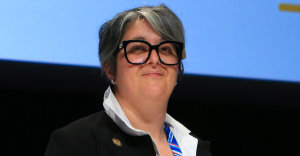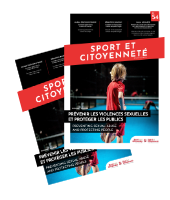“Helping managers to make their clubs safer”
 Laëtitia Pachoud, Vice-President of the French Rugby Federation (FFR) in charge of solidarity, is entrusted with the roll-out of the Federation’s schemes for preventing abuse and protecting the public, in line with the project being led by Colosse aux pieds d’argile.
Laëtitia Pachoud, Vice-President of the French Rugby Federation (FFR) in charge of solidarity, is entrusted with the roll-out of the Federation’s schemes for preventing abuse and protecting the public, in line with the project being led by Colosse aux pieds d’argile.
The FFR is the sports partner of the Colosse aux pieds d’argile project. Why did you join this consortium?
Joining this project seemed the logical extension of the agreements made with the PJJ and with Colosse aux pieds d’argile. We also think it is important to explain to young people that everybody can have problems, but that sport clubs and associations can help people pick themselves up and move forward. The family structure is vital, but sometimes, if it is lacking, help can come from others.
Is this in line with the unit for prevention and protection of people involved in rugby (C3PR) set up by the FFR?
This scheme was launched in 2019 and there are now six people in the team. There are two different, but inseparable strands. Firstly, we aim to ensure that any person who is aware of any dangerous situation, not confined to sexual abuse, in the rugby environment, can speak out and alert the unit. The alert is then dealt with in a systematic way and the victims are directed towards competent bodies recognised by the State. The second aspect focusses on supporting our managers. At present, 80% of our clubs are not equipped to deal with these situations. The federation has an obligation to ensure the physical and moral safety of our members.
The FFR has also long been committed to measures for prevention and reinsertion. For example, we were the first federation to sign an agreement with the Ministry of Justice to run a trial of alternative punishments (community work, unpaid work and so on). Rugby is a good setting for this kind of action. For rugby players, solidarity is not just a word.
France will be hosting the Rugby World Cup in a few months. What strategies with a social dimension will be used for this occasion?
To be awarded the organisation of the World Cup, we had to develop a solid project with a significant legacy aspect. Various themes are now being developed including social inclusion and employment and sport for health. As an example, schemes are being proposed in structures involved in supporting women who are victims of violence. The event will allow us to reinforce ways in which rugby can be used in daily life.
 Find this article and more in our special journal :
Find this article and more in our special journal :
PREVENTING SEXUAL ABUSE AND PROTECTING PEOPLE







 INSCRIPTION
INSCRIPTION CONTACT
CONTACT FACEBOOK
FACEBOOK